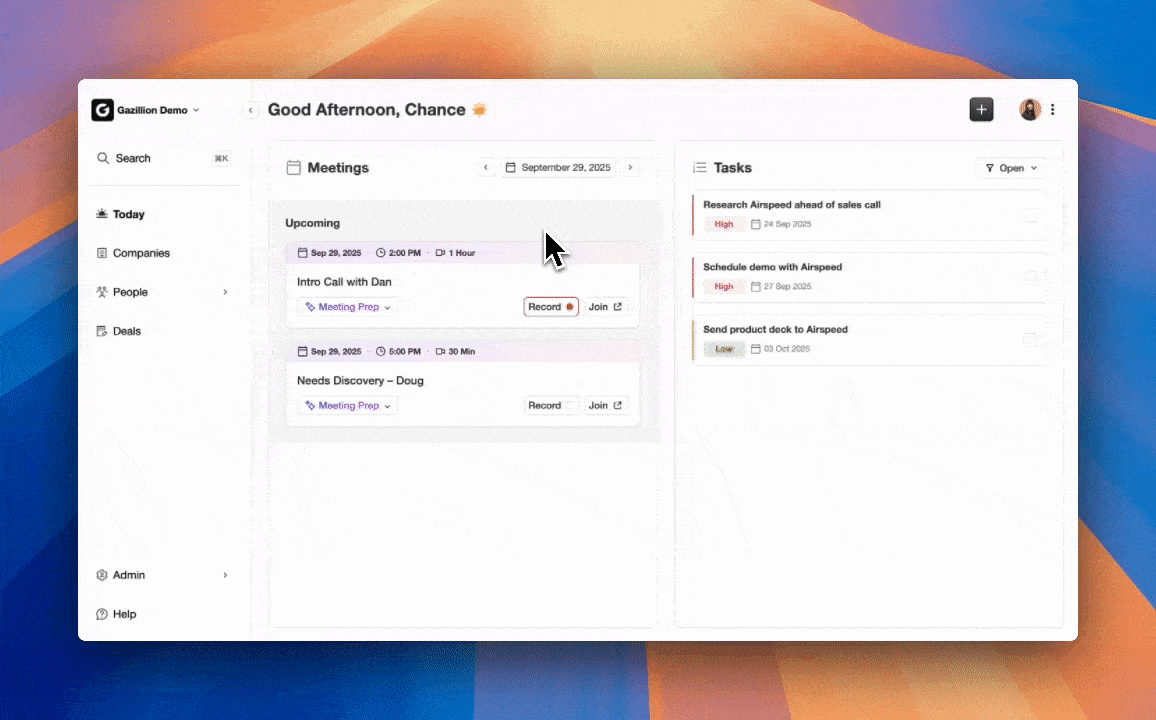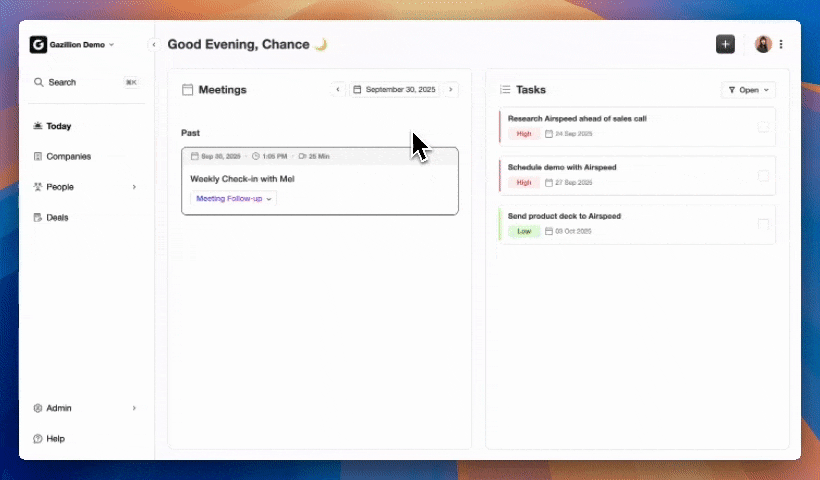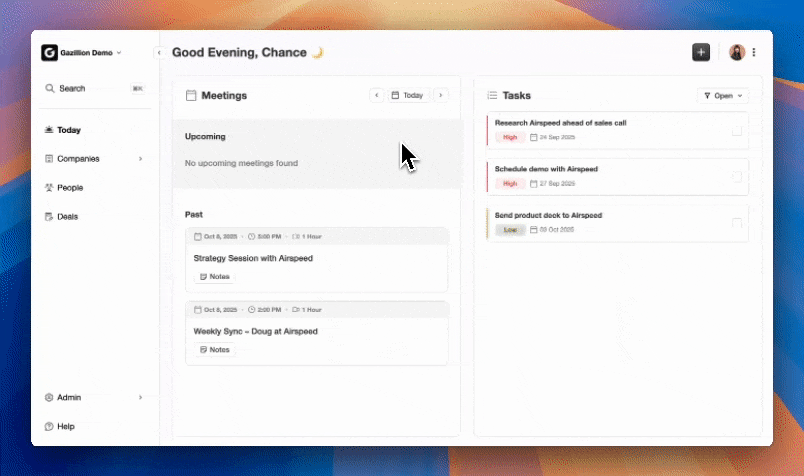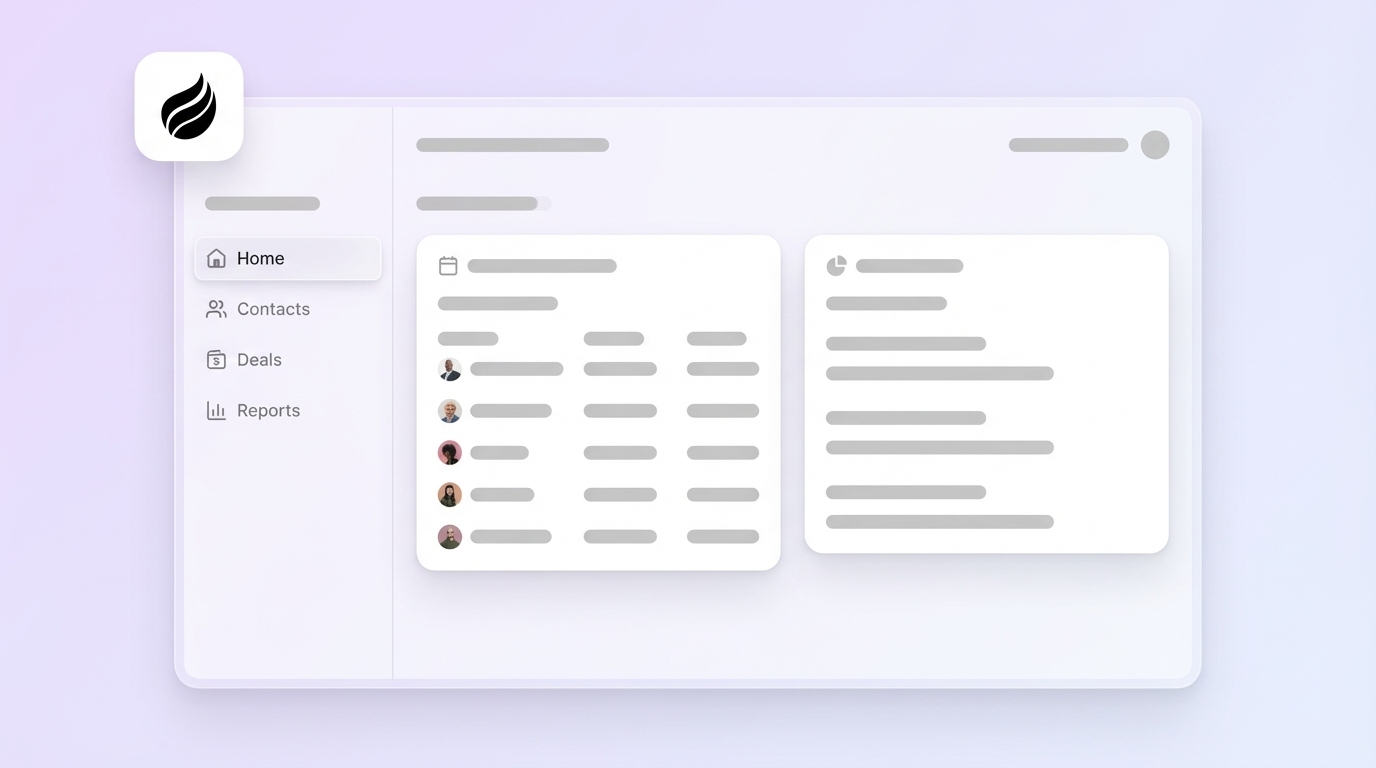Key Takeaways
- Manual, human-dependent data entry still undermines data quality, forecasting, and CRM adoption across most sales teams.
- Agent-led CRMs use automation to capture, enrich, and unify data from emails, calendars, and meetings with minimal rep effort.
- Effective 2026 CRM evaluations focus on automation depth, user adoption, integrations, and actionable AI, not just feature checklists.
- Salesforce, HubSpot, Zoho, Pipedrive, and Salesmate each offer strengths, but often depend on manual data maintenance and complex setup.
- Coffee provides an agent-led CRM and companion app that automates data capture and meeting workflows, helping teams keep accurate CRM data with less manual work; explore pricing and plans at Coffee.
The Persistent Problem: Why Legacy CRMs Fail the “Good Data In, Good Data Out” Test
Most CRMs still treat sales reps as data entry resources. This structure forces teams to log activities, update fields, and create records by hand before they can get value from reports or automations.
This manual approach costs time and accuracy. Reps lose selling hours to admin work, leaders struggle with unreliable forecasts, and customer views stay incomplete. Many teams fall back to shadow CRMs such as spreadsheets and side tools because the official CRM feels like extra work instead of a core system.
Data quality issues grow when systems cannot handle unstructured information from emails, calls, and meetings at scale. Legacy platforms such as Salesforce, built on older architectures, and HubSpot, expanded from marketing into CRM, often leave teams maintaining data manually instead of focusing on customers.
Agent-led CRMs take a different approach. Intelligent agents capture, enrich, and unify data directly from daily activity. The CRM shifts from a static database into an active system that keeps itself up to date for the team.
Essential Evaluation Criteria for Choosing a CRM in 2026
Modern CRM evaluations work best when they center on automation, data quality, and real-world usability instead of long feature lists.
Data Automation and Quality Beyond Human Input
Automation depth now matters more than manual flexibility. Strong CRMs can:
- Create and update contacts and accounts from emails and calendar activity
Systems that act as active data engines keep records accurate with less admin load. Teams then trust reports and use the CRM as a daily workspace, not a historical archive.
User Adoption Driven by Effortless Experience
High adoption follows when the CRM makes work easier. Helpful signs include:
- Minimal required fields and clicks for core workflows
- Automatic logging of common sales activities
- In-context insights that support calls, emails, and meetings
Reps engage with tools that remove chores and surface information when they need it.
Integration and a Consolidated Data Hub
A useful CRM in 2026 operates as a hub for customer activity. Effective platforms pull from email, calendar, video meetings, and sales tools into a single view, so teams do not bounce between systems to understand an account.
This unified approach reduces tool sprawl, simplifies onboarding, and improves coaching because everyone can see the same, current picture of the pipeline and key accounts.
AI and Intelligence for Proactive Insights
AI features now go beyond basic scoring or canned recommendations. Strong CRMs use intelligence to drive:
- Proactive nudges on stalled deals or missed follow-ups
- Automated workflows that move records through stages based on real activity
- Summaries of meetings and accounts that help reps prepare and follow up quickly
The key distinction lies between AI that waits for prompts and AI that acts as a worker on your behalf.

CRM Software Comparisons 2026: A Head-to-Head View
Salesforce: Enterprise Flexibility With Heavy Admin
Salesforce offers deep customization and a large ecosystem, which suits enterprises with complex processes and dedicated admins. Workflows, objects, and integrations can match detailed internal requirements.
For smaller and mid-market teams, the same flexibility often introduces friction. Manual data entry remains high, setup and customization can require consulting partners, and older architecture can feel slow when processing large volumes of unstructured data. Many teams underuse the system or keep key details outside Salesforce.
HubSpot: Marketing-Led Platform With CRM Additions
HubSpot connects marketing and sales in a single platform with a clean interface and accessible automation. This can work well for teams that rely heavily on inbound marketing.
The CRM layer still expects significant manual updates. Without strong autonomous data capture and unification, teams may continue to manage contacts and activities by hand, which limits data quality and sales visibility.
Zoho CRM: Feature-Rich With AI Assistance
Zoho CRM provides broad functionality at a competitive price point, including Zia, an AI assistant for lead scoring and forecasting. Integrations and low-code tools add flexibility for teams with technical support.
Reps may still need to handle much of the data management themselves. The interface and configuration options can feel complex, which can slow adoption for less technical teams.
Pipedrive and Salesmate: Streamlined Pipelines, Manual Data
Pipedrive and Salesmate focus on simple pipeline views and straightforward sales workflows. Smaller teams often appreciate their clear layouts and faster initial rollout.
These tools still depend on manual activity logging and updates for accurate data. Without deeper automation or intelligence, they share many of the same data quality and admin challenges as larger CRMs.
Coffee: Agent-Led CRM for B2B Sales Teams
Coffee centers its design on an AI agent that manages CRM data work. The system aims to keep data accurate without turning reps into data entry staff.
The Coffee Agent can:
- Create contacts and companies from email and calendar interactions
- Log touchpoints across channels and keep timelines current
- Enrich records with job titles, company details, and profiles
- Join or record meetings, transcribe calls, and generate recaps and follow-up drafts
Coffee’s Pipeline Intelligence tracks changes automatically and surfaces progressed deals, stalled opportunities, and new additions. Weekly reviews shift from status gathering to analysis because the system has already captured the details.
Many teams use Coffee to reduce reliance on point tools for note-taking, call summaries, and simple research. Time savings of several hours per rep per week create room for more selling and coaching.
Coffee operates in two modes. The standalone AI-first CRM fits teams moving from spreadsheets or lightweight tools. The companion app connects to Salesforce or HubSpot and improves data quality in the existing system of record without a full migration.

Teams that want an agent-led approach can evaluate Coffee as either a primary CRM or an automation layer for an existing stack. Details and pricing are available at Coffee.
Comparison Table: Key CRM Capabilities
|
Feature/Capability |
Salesforce |
HubSpot |
Coffee |
|
Primary approach |
Database and customization |
Marketing plus CRM |
Agent-led automation |
|
Manual data entry |
High |
High |
Low, the agent handles most updates |
|
Data quality enhancement |
Manual or add-ons |
Manual or add-ons |
Autonomous agent-driven enrichment |
|
User adoption focus |
Customization options |
Ease of use |
Removal of admin chores |
The Decision Framework: Matching CRM Choice to Your Needs
Effective CRM selection starts with a clear view of current pain points. Teams that struggle most with manual logging, incomplete records, and low rep engagement tend to benefit from stronger automation and data quality controls.
Agent-led tools such as Coffee can help when organizations want to:
- Reduce time spent on data entry and meeting notes
- Improve the accuracy and freshness of pipeline data
- Consolidate tools used for enrichment, notes, and basic research
- Layer automation on top of Salesforce or HubSpot without re-platforming
Teams that prioritize deep custom objects or highly specialized workflows may still select traditional CRMs, but they often pair them with automation layers to address data quality gaps.
For teams that want to test an agent-led model, Coffee provides a practical starting point.

Conclusion: Why Agent-Led CRMs Fit 2026 Sales Teams
Manual, database-first CRMs created value when alternatives were limited, but they now strain under growing data volume and complexity. Agent-led systems respond to this shift by treating automation and data quality as the foundation, not an add-on.
Organizations that adopt this model place less burden on reps, gain more reliable data, and create space for better coaching and analysis. For teams that want to explore an agent-led approach with practical, sales-focused workflows, Coffee offers a focused option for 2026 planning and beyond.
Frequently Asked Questions (FAQ) About CRM Software
How does an agent-led CRM like Coffee differ from CRMs with built-in AI, such as Zoho’s Zia?
Tools like Zia assist with insights and scoring, but still expect humans to create and update records. Coffee uses its agent to handle data capture and enrichment directly from activity, so less information depends on manual logging.
Can Coffee help if the team already uses Salesforce or HubSpot?
Yes. The Coffee companion app connects to existing Salesforce or HubSpot instances and focuses on improving data in those systems. The agent captures activities, maintains records, and supports meeting workflows while the legacy CRM remains the primary database.
How does Coffee handle data security?
Coffee is SOC 2 Type 2 and GDPR compliant. Data stays private to the customer environment and is not used to train public AI models. The agent accesses communications only to perform agreed automation tasks.
What impact can Coffee have on sales rep productivity?
By automating data entry, enrichment, and meeting documentation, Coffee can return several hours per rep per week to selling and customer work. Teams often see higher CRM adoption because the system does more of the routine work for them.
